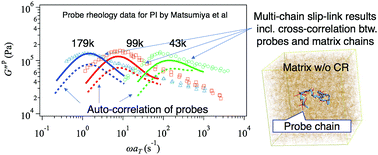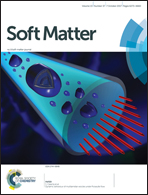Primitive chain network simulations of probe rheology
Abstract
Probe rheology experiments, in which the dynamics of a small amount of probe chains dissolved in immobile matrix chains is discussed, have been performed for the development of molecular theories for entangled polymer dynamics. Although probe chain dynamics in probe rheology is considered hypothetically as single chain dynamics in fixed tube-shaped confinement, it has not been fully elucidated. For instance, the end-to-end relaxation of probe chains is slower than that for monodisperse melts, unlike the conventional molecular theories. In this study, the viscoelastic and dielectric relaxations of probe chains were calculated by primitive chain network simulations. The simulations semi-quantitatively reproduced the dielectric relaxation, which reflects the effect of constraint release on the end-to-end relaxation. Fair agreement was also obtained for the viscoelastic relaxation time. However, the viscoelastic relaxation intensity was underestimated, possibly due to some flaws in the model for the inter-chain cross-correlations between probe and matrix chains.



 Please wait while we load your content...
Please wait while we load your content...